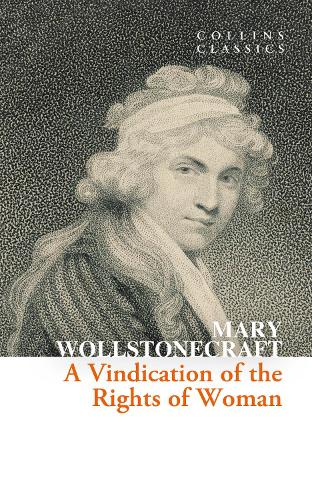
A Vindication of the Rights of Woman (Collins Classics)
(Paperback)
Publishing Details
A Vindication of the Rights of Woman (Collins Classics)
By (Author) Mary Wollstonecraft
HarperCollins Publishers
William Collins
16th June 2025
13th February 2025
United Kingdom
Classifications
General
Non Fiction
Social and political philosophy
Philosophy and theory of education
Western philosophy: Enlightenment
Philosophy: epistemology and theory of knowledge
Dating, relationships, living together and marriage: advice, topics and issues
Feminism and feminist theory
Essays
323.34
Physical Properties
Paperback
320
Width 111mm, Height 178mm, Spine 24mm
180g
Description
HarperCollins is proud to present its range of best-loved, essential classics.
My own sex, I hope, will excuse me, if I treat them like rational creatures, instead of flattering their fascinating graces, and viewing them as if they were in a state of perpetual childhood, unable to stand alone.
In the midst of revolution, when fundamental social upheaval was reshaping France and America, writer and philosopher Mary Wollstonecraft made an impassioned argument for women to have a place in this new world. Her demands laid out in this 1792 essay, to treat women as human beings deserving of a rational education, self-determination and equal rights alongside men, laid the foundation for modern feminism.
Wollstonecraft has been admired and loathed: called a hyena in petticoats by Horace Walpole and an inspiration to writers and feminists such as George Eliot and Millicent Fawcett. A Vindication of the Rights of Woman is a key text to understand the making of the modern world.
Reviews
Praise for Wollstonecraft:
"The Revolution was not merely an event that had happened outside her; it was an active agent in her own blood." Virginia Woolf in Four Figures.
"A pioneer feminist who urged the case for political representation and economic independence of women." Millicent Fawcett, in her introduction to A Vindication of The Rights of Woman, 1891 edition.
Author Bio
Born in 1759, Mary Wollstonecraft was a writer and philosopher whose most enduring text, A Vindication of the Rights of Woman, laid the foundation for modern feminism. She travelled to revolutionary France as a young woman to witness and participate in the radical social change taking place there. Throughout her life she wrote in favor of equal rights and women's rational education, her work inspiring authors and thinkers including Jane Austen, Elizabeth Barrett Browning, George Eliot and Millicent Garrett Fawcett. She died aged 38, soon after giving birth to her daughter Mary Shelley, a pioneering and radical author in her own right.
